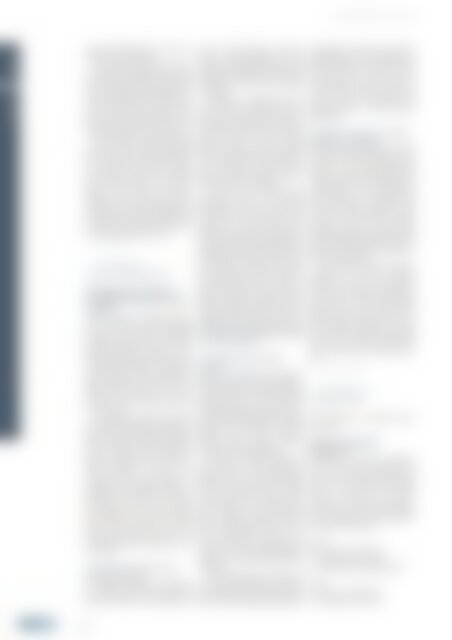atw - International Journal for Nuclear Power | 05.2019
You also want an ePaper? Increase the reach of your titles
YUMPU automatically turns print PDFs into web optimized ePapers that Google loves.
<strong>atw</strong> Vol. 64 (2019) | Issue 5 ı May<br />
292<br />
NEWS<br />
operation. The order has a volume of<br />
well over EUR 20 million.<br />
The casks are to be delivered from<br />
the GNS plant in Mülheim an der Ruhr<br />
to the two power plants in the fourth<br />
quarter of 2020. After loading in the<br />
reactor building with 19 fuel elements<br />
each, the casks will be taken to the<br />
local interim storage facilities. More<br />
than 30 loaded casks of this type are<br />
already stored at each of the two sites.<br />
„The CASTOR® casks from GNS<br />
have proven to be reliable packaging<br />
<strong>for</strong> the irradiated fuel elements from<br />
our nuclear power plants”, explains<br />
Lothar Mertens, Head of Fuel Cycle<br />
and Interim Storage at Preussen-<br />
Elektra. “They ensure the smooth<br />
emptying of our storage pools and<br />
thus <strong>for</strong>m an important component in<br />
the disposal of our power plants both<br />
during power operation and until the<br />
reactor is completely fuel-free.”<br />
| | www.gns.de<br />
Science & Research<br />
LENS launches activities to<br />
strengthen European neutron<br />
science<br />
(lens) Members of a strategic consortium<br />
of neutron research facilities<br />
in Europe, the League of advanced<br />
European Neutron Sources (LENS),<br />
officially launched activities to promote<br />
colla boration on neutron usage,<br />
technology development, innovation,<br />
data, education, and strategies. By<br />
aligning policies among its partners,<br />
LENS will advocate <strong>for</strong> the user<br />
community and strengthen European<br />
neutron science.<br />
The members of LENS held their<br />
first General Assembly and the first<br />
Executive Board meeting on 26 March<br />
2019 in Liblice, the Czech Republic.<br />
The consortium adopted and signed<br />
Statutes detailing the purpose of<br />
LENS, guiding the work of the<br />
statutory bodies, and laying the<br />
framework <strong>for</strong> Working Groups responsible<br />
<strong>for</strong> the execution of <strong>for</strong>eseen<br />
activities. The Director of Institut<br />
Laue-Langevin (ILL) in France, Helmut<br />
Schober, was elected as LENS<br />
Chair, and the Director of the ISIS<br />
Neutron and Muon Source in the<br />
United Kingdom, Robert McGreevy, as<br />
Vice-Chair.<br />
A community event to mark<br />
the launch of LENS<br />
The signing ceremony was followed<br />
by a public event that celebrated the<br />
launch of LENS in the presence of<br />
around 80 government representatives,<br />
national delegates to the<br />
European Strategy Forum on Research<br />
Infrastructures (ESFRI), the European<br />
Commission, and the wider scientific<br />
community.<br />
“Research on materials will provide<br />
the basis <strong>for</strong> technologies of the<br />
future that are needed to achieve a<br />
sustainable, high standard of living all<br />
around the globe,” said the newly<br />
elected Chair of LENS, Helmut<br />
Schober. “LENS will help to develop<br />
these technologies by optimizing the<br />
use of resources <strong>for</strong> neutron investigations<br />
through strategic coordination<br />
among neutron facilities.”<br />
The event also featured panel<br />
discussions about the long-term<br />
sustainability of neutron sources, and<br />
the various ways in which neutrons<br />
contribute to excellent science and<br />
advance innovation. As a collaborative<br />
ef<strong>for</strong>t that aims to benefit researchers<br />
and address their needs, LENS seeks to<br />
establish good working relations with<br />
the European Neutron Scattering<br />
Association (ENSA). LENS will be in<br />
close dialogue with the League of<br />
European Accelerator-based Photon<br />
Sources (LEAPS), a strategic consortium<br />
that brings together synchrotron<br />
radiation and free electron laser user<br />
facilities in Europe. Representatives of<br />
both ENSA and LEAPS joined the LENS<br />
launch event in Liblice.<br />
The member base of LENS<br />
expands<br />
LENS was established in September<br />
2018 with the primary goal of facilitating<br />
discussions and decision-making<br />
processes that have the potential to<br />
strengthen European neutron science.<br />
The eight founding members include<br />
national and international neutron<br />
facilities from France, Germany,<br />
Hungary, Norway, Sweden, Switzerland,<br />
and the United Kingdom.<br />
The event in Liblice marked the<br />
first expansion of the consortium’s<br />
member base. Forschungszentrum<br />
Jülich from Germany with its Jülich<br />
Centre <strong>for</strong> Neutron Science (JCNS)<br />
was welcomed as the ninth member.<br />
LENS is open to new members and<br />
other qualifying neutron facilities<br />
which grant international access to<br />
their experimental devices and<br />
research services are invited to join at<br />
any time. In this way, LENS helps to<br />
contribute to the scientific integration<br />
of Europe.<br />
The LENS launch was held on the<br />
eve of the 68 th ESFRI Forum Meeting,<br />
which brought together senior science<br />
policy officials representing Ministers<br />
responsible <strong>for</strong> research in each of the<br />
participating state. “We welcome the<br />
launch of LENS. Coordinated ef<strong>for</strong>ts of<br />
this type support a better use and<br />
development of research infra structures<br />
in Europe. This is well in line<br />
with the vision that ESFRI has <strong>for</strong><br />
European science, “ said Jan Hrušák,<br />
ESFRI Chair.<br />
Shaping the future by utilising<br />
members’ capabilities<br />
Solving the grand challenges facing<br />
our societies often requires the development<br />
of new high-per<strong>for</strong>mance<br />
materials. Tailor-made materials and<br />
material systems are required <strong>for</strong> the<br />
advancement of key technologies,<br />
from in<strong>for</strong>mation technology and<br />
renewable energy concepts, to safer<br />
and more environmentally friendly<br />
transport systems and life-saving<br />
medical applications. Probing materials<br />
with neutrons stands as one of the<br />
pillars of the analytical techniques in<br />
this chain of discovery.<br />
Neutron-based analytical facilities,<br />
there<strong>for</strong>e, are used in numerous<br />
disciplines across the entire range of<br />
science and technology development,<br />
and generate a high socio-economic<br />
impact. Europe has achieved global<br />
leadership in this field, serving a very<br />
broad scientific community of more<br />
than 5,000 researchers by providing<br />
them with more than 32,000 instrument<br />
days at neutron scattering facilities.<br />
| | www.frm2.tum.de<br />
Market data<br />
(All in<strong>for</strong>mation is supplied without<br />
guarantee.)<br />
<strong>Nuclear</strong> Fuel Supply<br />
Market Data<br />
In<strong>for</strong>mation in current (nominal)<br />
U.S.-$. No inflation adjustment of<br />
prices on a base year. Separative work<br />
data <strong>for</strong> the <strong>for</strong>merly “secondary<br />
market”. Uranium prices [US-$/lb<br />
U 3 O 8 ; 1 lb = 453.53 g; 1 lb U 3 O 8 =<br />
0.385 kg U]. Conversion prices [US-$/<br />
kg U], Separative work [US-$/SWU<br />
(Separative work unit)].<br />
2014<br />
pp<br />
Uranium: 28.10–42.00<br />
pp<br />
Conversion: 7.25–11.00<br />
pp<br />
Separative work: 86.00–98.00<br />
2015<br />
pp<br />
Uranium: 35.00–39.75<br />
pp<br />
Conversion: 6.25–9.50<br />
News

















